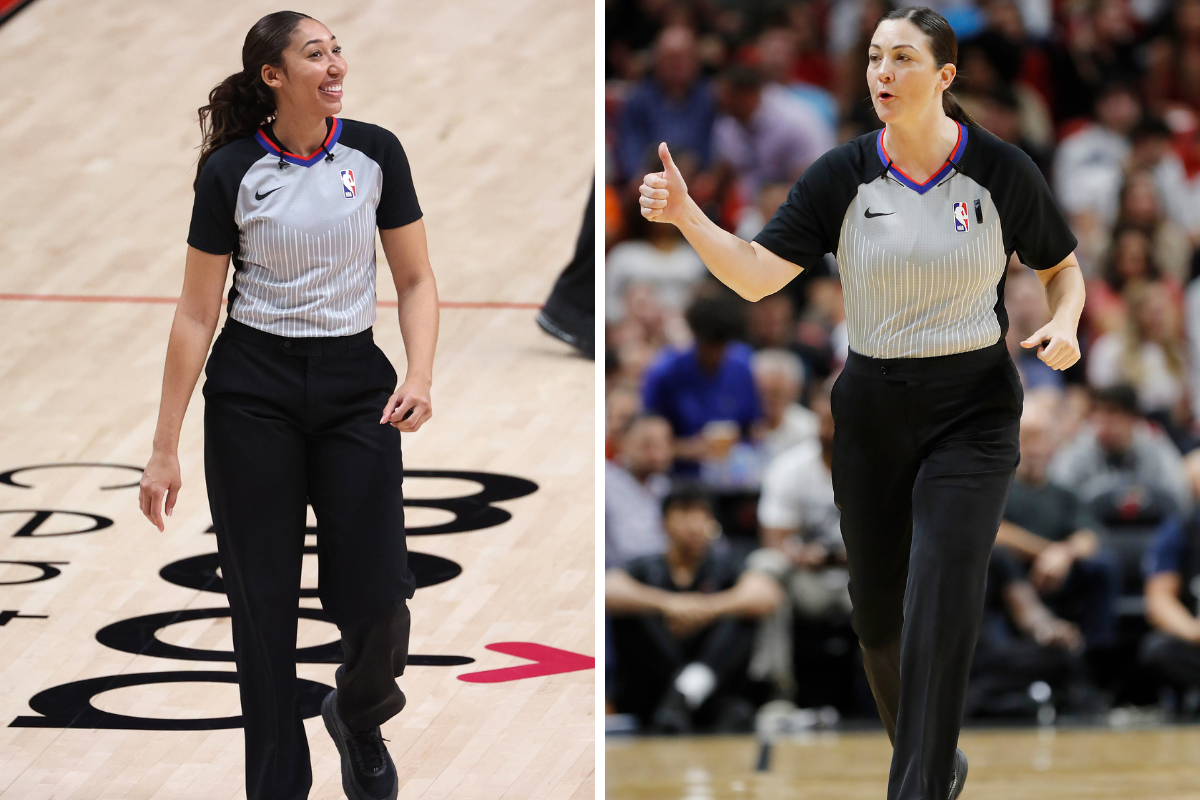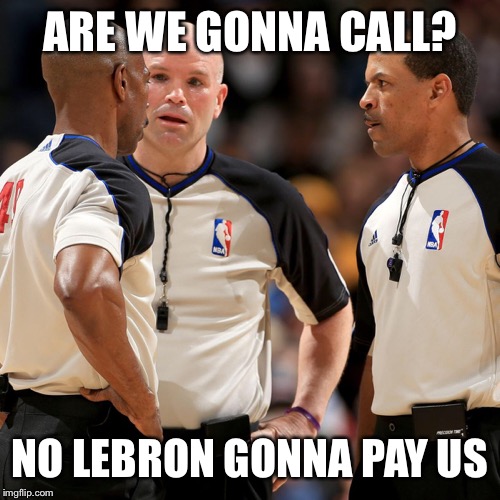NBA Refs Pay: The Untold Story Behind The Whistle
Ever wondered how much NBA refs make? You're not alone. The world of professional basketball is filled with superstar players, glamorous arenas, and millions of fans tuning in every night—but what about the guys in stripes? The referees who keep the game fair, call the fouls, and often end up in the spotlight for all the wrong reasons? Let’s dive deep into NBA refs pay, uncovering the facts, figures, and everything you need to know.
It’s no secret that being an NBA ref isn’t just about blowing a whistle and pointing fingers. These guys are highly skilled professionals who go through rigorous training, years of experience, and face immense pressure every game night. But when it comes to their compensation, the details are often shrouded in mystery. How much do NBA refs really make? Is it worth the stress and scrutiny? Let’s break it down.
This article will take you on a journey through the world of NBA referees, exploring everything from their salaries to the challenges they face on and off the court. Whether you're a die-hard basketball fan or simply curious about the business side of sports, you're about to learn something new. So, grab your favorite drink, sit back, and let’s get to the bottom of NBA refs pay.
Read also:Unveiling The Secrets Behind S Zi Net Worth A Comprehensive Guide
Table of Contents
- Biography of NBA Referees
- Average NBA Refs Pay
- The Training Process
- Career Path of an NBA Referee
- Challenges Faced by NBA Refs
- Long-Term Benefits and Perks
- Famous NBA Referees
- Stats and Numbers
- Future Prospects for NBA Referees
- Conclusion
Biography of NBA Referees
Before we jump into the nitty-gritty of NBA refs pay, let’s take a moment to understand who these individuals are. NBA referees aren’t just people who show up to games and start calling fouls—they’re highly trained professionals with years of experience under their belts.
Most NBA referees start their careers in lower-level leagues, such as the NBA G League or even college basketball. They work their way up through the ranks, proving their skills and dedication before earning a spot in the big leagues. It’s a long and challenging journey, but those who make it are among the best in the business.
Typical Background
Here’s a quick rundown of what it takes to become an NBA referee:
- Education: While there’s no specific degree required, many refs have backgrounds in sports or physical education.
- Experience: Years of officiating at various levels, from high school to college to pro leagues.
- Training: Extensive training programs offered by the NBA, including fitness tests, rules knowledge, and on-court practice.
Data and Info
| Name | Age | Years of Experience | League History |
|---|---|---|---|
| Scott Foster | 54 | 22 | G League, NBA |
| Joe DeRosa | 58 | 27 | College, G League, NBA |
Average NBA Refs Pay
Now, let’s get to the heart of the matter: how much do NBA refs make? The salary of an NBA referee can vary widely depending on factors like experience, seniority, and performance. But on average, NBA referees earn between $150,000 and $550,000 per year. Not bad for a job that involves a lot of running, decision-making, and dealing with angry players and coaches!
Keep in mind that this is just the base salary. Referees can earn additional income through playoff games, All-Star events, and other special occasions. The more experienced and senior a ref is, the higher their pay tends to be.
Factors Affecting Pay
- Experience: Senior refs earn significantly more than rookies.
- Performance: Consistently good calls and positive evaluations can lead to pay raises.
- Game Importance: Refereeing high-stakes games, like the NBA Finals, comes with extra compensation.
The Training Process
Becoming an NBA referee isn’t as easy as putting on a striped shirt and picking up a whistle. The training process is intense and designed to prepare refs for the high-pressure environment of professional basketball. Here’s a glimpse into what it entails:
Read also:Discover The Best At Toyota Of Knoxville Tn Your Ultimate Car Buying Guide
Prospective refs undergo a series of evaluations, including fitness tests, rules exams, and on-court assessments. They must demonstrate not only a deep understanding of the game but also the ability to make quick, accurate decisions under pressure. Once they pass the initial screening, they move on to more advanced training, often in the G League, where they hone their skills before making the leap to the NBA.
Key Training Elements
- Physical Fitness: Refs must maintain peak physical condition to keep up with the fast-paced nature of the game.
- Rules Knowledge: A thorough understanding of the NBA rulebook is essential.
- Mental Toughness: Refs need to stay calm and composed, even when faced with intense scrutiny from players, coaches, and fans.
Career Path of an NBA Referee
A typical career path for an NBA referee begins in lower-level leagues, where they gain experience and develop their skills. After several years of officiating in college or the G League, the most talented refs are invited to join the NBA officiating program. From there, they work their way up the ranks, earning more responsibility and higher pay with each passing season.
Some refs may spend decades in the league, while others choose to retire after a few years. Regardless of how long they stay, the experience and knowledge gained from officiating at the highest level of basketball is invaluable.
Challenges Faced by NBA Refs
Being an NBA referee isn’t all glitz and glamour. These guys face a host of challenges on and off the court, from dealing with angry players and coaches to handling the intense scrutiny of fans and media. Here’s a look at some of the biggest challenges they face:
- Pressure: Every call they make is scrutinized by millions of people, and mistakes can have huge consequences.
- Physical Demands: Refs must be in top physical condition to keep up with the fast pace of the game.
- Mental Fatigue: The mental toll of making split-second decisions under pressure can be exhausting.
Long-Term Benefits and Perks
Despite the challenges, there are plenty of benefits to being an NBA referee. Beyond the competitive salary, refs enjoy perks like travel opportunities, access to top-tier facilities, and the chance to work with some of the best athletes in the world. Many refs also go on to have successful careers in other areas of sports, using the skills and experience they gained as referees.
Perks of Being an NBA Ref
- Access to exclusive events and games.
- Networking opportunities with players, coaches, and other sports professionals.
- Potential for career advancement within the NBA or other sports organizations.
Famous NBA Referees
Some NBA referees have become household names, thanks to their larger-than-life personalities and memorable moments on the court. Here are a few of the most famous refs in NBA history:
- Joe Crawford: Known for his fiery personality and willingness to eject players and coaches, Crawford is one of the most recognizable refs in NBA history.
- Scott Foster: A veteran ref with over two decades of experience, Foster is respected for his consistency and fairness.
- Vinnie Rotunda: Often called the "ref with the best hair," Rotunda is known for his calm demeanor and ability to defuse tense situations.
Stats and Numbers
When it comes to NBA refs pay, the numbers tell an interesting story. According to recent data, the average salary for an NBA referee is around $250,000 per year, with top-tier refs earning closer to $500,000. These figures can fluctuate based on factors like experience, performance, and the number of games officiated.
Interestingly, the number of referees in the NBA has been steadily increasing over the years, with the league now employing around 60-70 full-time refs. This growth reflects the increasing demand for skilled officials to keep up with the growing popularity of the sport.
Future Prospects for NBA Referees
As the NBA continues to grow in popularity, the demand for skilled referees is likely to increase. Advances in technology, such as instant replay and video review, are also changing the way referees do their jobs, making it more important than ever for them to stay up-to-date with the latest tools and techniques.
For aspiring refs, the future looks bright. With the right training, dedication, and passion for the game, anyone can make it to the top of the officiating world. And who knows? Maybe one day you’ll be calling fouls on LeBron James or Steph Curry!
Conclusion
So, there you have it—the inside scoop on NBA refs pay. From their rigorous training and challenging careers to their impressive salaries and long-term benefits, there’s a lot more to being an NBA referee than meets the eye. The next time you watch a game and see a ref make a tough call, take a moment to appreciate the hard work and dedication that goes into their job.
And hey, if you’re thinking about pursuing a career as an NBA ref, remember this: it’s not just about the money—it’s about the love of the game, the thrill of the challenge, and the chance to be part of something truly special. So, whether you’re a fan, a player, or an aspiring ref, the world of NBA officiating has something for everyone.
Got questions or comments? Drop them below, and let’s keep the conversation going. And don’t forget to share this article with your friends—knowledge is power, and who knows? Maybe one day you’ll be the one blowing the whistle!


